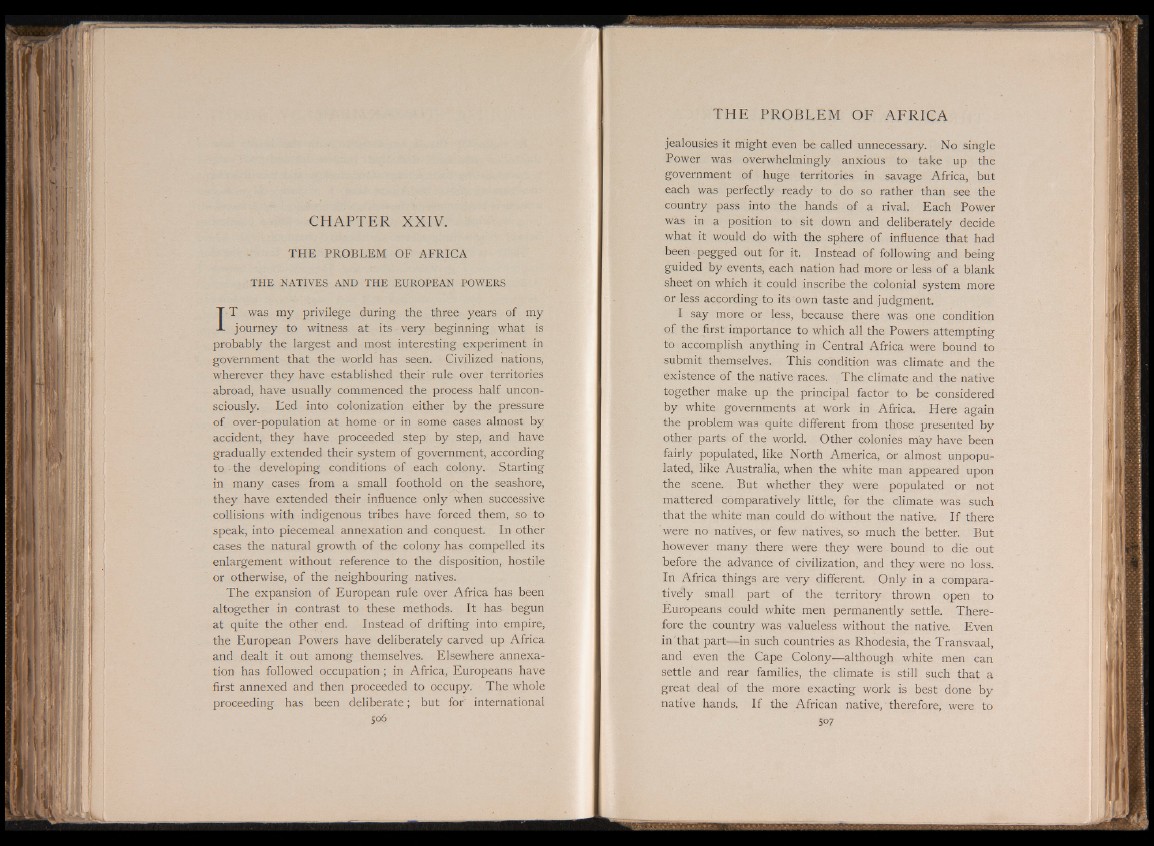
C H A P T E R X X IV .
T H E P R O B L EM O F A F R IC A
THE NATIVES AND THE EUROPEAN POWERS
I-T was my privilege during the three years of my
journey to witness at its very beginning what is
probably the largest and most interesting experiment in
government that the world has seen. Civilized nations,
wherever they have established their rule over territories
abroad, have usually commenced the process half unconsciously.
Led into colonization either by the pressure
of over-population at home or in some cases almost by
accident, they have proceeded step by step, and have
gradually extended their system of government, according
to the developing conditions of each colony. Starting
in many cases from a small foothold on the seashore,
they have extended their influence only when successive
collisions with indigenous tribes have forced them, so to
speak, into piecemeal annexation and conquest. In other
cases the natural growth of the colony has compelled its
enlargement without reference to the disposition, hostile
or otherwise, of the neighbouring natives.
The expansion of European rule over Africa has been
altogether in contrast to these methods. It has begun
at quite the other end. Instead of drifting into empire,
the European Powers have deliberately carved up Africa
and dealt it out among themselves. Elsewhere annexation
has followed occupation; in Africa, Europeans have
first annexed and then proceeded to occupy. The whole
proceeding has been deliberate; but for' international
506
T H E P R O B L EM OF A F R I C A
jealousies it might even be called unnecessary. No single
Power was overwhelmingly anxious to take up the
government of huge territories in savage Africa, but
each was perfectly ready to do so rather than see the
country pass into the hands of a rival. Each Power
was in a position to sit down and deliberately decide
what it would do with the sphere of influence that had
been pegged out for it. Instead of following and being
guided by events, each nation had more or less of a blank
sheet on which it could inscribe the colonial system more
or less according to its own taste and judgment.
I say more or less, because there was one condition
of the first importance to which all the Powers attempting
to accomplish anything in Central Africa were bound to
submit themselves. This condition was climate and the
existence of the native races. The climate and the native
together make up the principal factor to be considered
by white governments at work in Africa. Here again
the problem was quite different from those presented by
other parts of the world. Other colonies may have been
fairly populated, like North America, or almost unpopulated,
like Australia, when the white man appeared upon
the scene. But whether they were populated or not
mattered comparatively little, for the climate was such
that the white man could do without the native. If there
were no natives, or few natives, so much the better. But
however many there were they were bound to die out
before the advance of civilization, and they were no loss.
In Africa things are very different. Only in a comparatively
small part of the territory thrown open to
Europeans could white men permanently settle. Therefore
the country wras valueless without the native. Even
in that part—in such countries as Rhodesia, the Transvaal,
and even the Cape Colony—although white men can
settle and rear families, the climate is still such that a
great deal of the more exacting work is best done by
native hands. If the African native/therefore, were to
S°7